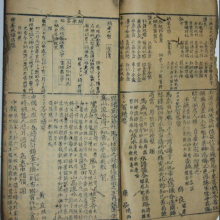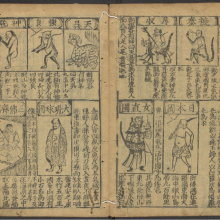Category books (leishu 類書) are an important cornerstone for the compilation and delineation of knowledge in Imperial China. Since the third century, this genre has encapsulated the Chinese approach to encyclopedic knowledge of the sinosphere: it orders knowledge into categories (lei 類) for further reference. Aside from the prominent elite and imperial projects that produced a large compilation of elite knowledge, leishu later on proliferated into a branch called household (or daily) encyclopedia (riyong leishu 日用類書), which systematically collected “lowbrow” knowledge from the general public’s everyday experience o.
This project traces the production and circulation of common knowledge, starting with the household encyclopedia, to understand the selection and compilation process of such knowledge when the intellectual focus of the society shifted from imperial elite knowledge to daily knowledge in late imperial China. We employ digital methods that detect, trace, and visualize textual/visual copying of sources, which has been the major approach of preserving and circulating human knowledge, to reveal the origins of contents collected in the household encyclopedia.



